Podcasts
The Organic Science Conversations Podcasts feature interviews with OSC3 researchers interested in the challenges of organic production.
Growing organic vegetables as an act of environmental stewardship (February 2021)
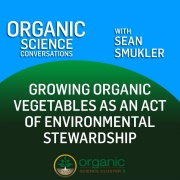
"We pay farmers to produce food, but we need farmers to be stewards of our global landscape." Sustainable vegetable production can shape the agricultural landscape: Sean Smukler, from UBC, is building an online tool to enhance nutrient management planning in vegetable production and to provide better stewardship of the land.
Ecological food sovereighty in cold countries: The fascinating yield of organic greenhouses (January 2021)
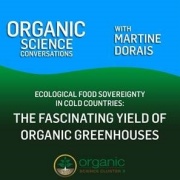
Martine Dorais, a researcher at Université Laval, has participated in 16 research activities within the framework of the Organic Science Clusters. Nine of these activities deal with greenhouse production. She tells us about major advances in fertilization, substrates, lighting and effluent control in greenhouses and describes the greenhouse of her dreams, a zero-waste hybrid complex.
A tribute to Jennifer Mitchell Fetch: the patient art of organic oat breeding (June 2020)
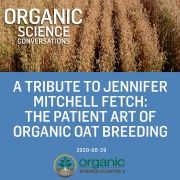
Armed with patience and a talent for fortune telling, Dr. Jennifer Mitchell Fetch describes how, over 17 years of work, she has created two new oat cultivars selected to thrive under organic management: AAC Oravena and AAC Kongsore.
Read the interview [PDF- 311.43 KB]
Lire l'interview [PDF 323 KB]
Net GHG emissions of Canadian field crops: how well do organic crops perform? (June 2020)
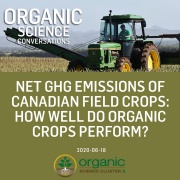
Food systems contribute a large share of global greenhouse gas emissions. But what about organic production systems?
Dr. Peter Tyedmers leads a valuable research activity to estimate the level of greenhouse gas emissions of Canadian organic field crop production systems. He invites all Canadian organic field crop farmers to join this research activity.
Read the interview [PDF 254 KB]
Lire l'interview [PDF 342 KB]
Berry byproducts in poultry feed: an alternative to antibiotics? (June 2020)
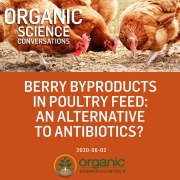
What if we could replace the antibiotics used in broiler production with berry products? Dr. Moussa Diarra has found exciting results in his OSC3 research activity when feeding organic cranberry and wild blueberry pomace to organic broiler chickens.
Read the interview [PDF- 281.72 KB]
Lire l'interview [PDF 297 KB]
Sourcing phosphorus from human wastewater to feed organic soils (May 2020)
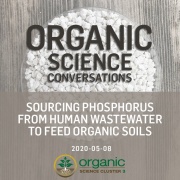
Phosphorus is an essential nutrient which is often in short supply on organic farms, particularly Prairie farms. Kimberley Schneider and her colleague Henry Wilson are conducting a unique research activity: using struvite, derived from wastewater, to address the phosphorus deficit in certain organically managed soils and to provide a renewable source of phosphorus.
Read the interview [PDF 299 KB]
Lire l'interview [PDF 208 KB]
Flower Power: Attracting pollinators and beneficials in field crops (May 2020)
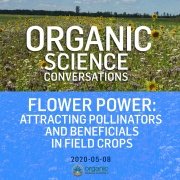
Beneficial insects, such as pollinators, provide ecosystem services that can improve the sustainability of crop production. Jason Gibbs is measuring how strips of flowers can influence the abundance and diversity of beneficial insects on both organic and non-organic farms. He will evaluate how the change in beneficial organisms can enhance pollination and biological pest control in both organic and non-organic farms in Manitoba.
Read the interview [PDF- 400 KB]
Lire l'interview [PDF 445 KB]
Les saponines pour passer un savon aux nuisibles en serre
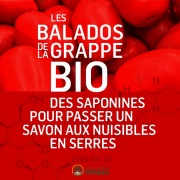
Simon Lachance, chercheur à l’Université de Guelph, est à la recherche de biopesticides pour lutter contre les ravageurs en serre. Il extrait des saponines des résidus de tomates en serre afin de tester les propriétés antifongiques et insecticides de cette molécule bioactive dont le potentiel phytochimique est peu exploité en serriculture en Ontario.
Lire l'interview [PDF- 309 KB]
Read the interview [PDF 278 KB]
La guerre des punaises pour produire des fraises bio
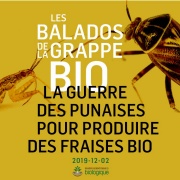
Dans les champs de fraises biologiques du Québec se déroule une guerre des punaises sans pitié.
Les docteurs Caroline Provost et François Dumont décrivent comment la punaise Nabis americoferus et la minuscule punaise Orius insidiosus sont des mercenaires utilisés pour lutter contre la punaise terne.
Lire l'interview [PDF- 706 KB]
Read the interview [PDF 610 KB]
Des jeunes pousses bio dans un jardin fleuri à l’IRDA
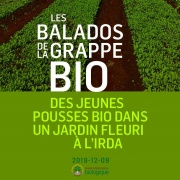
Les pousses sont de plus en plus recherchées par les consommateurs : leur saveur et leur fraîcheur en font des aliments souvent consommés au quotidien. Voilà pourquoi une équipe de l’IRDA menée par Caroline Côté se penche sur la production des pousses sous régie biologique, de jeunes plants que les organismes nuisibles apprécient tout autant que les consommateurs.
Lire l'interview [PDF- 305 KB]
Read the interview [PDF 276 KB]
